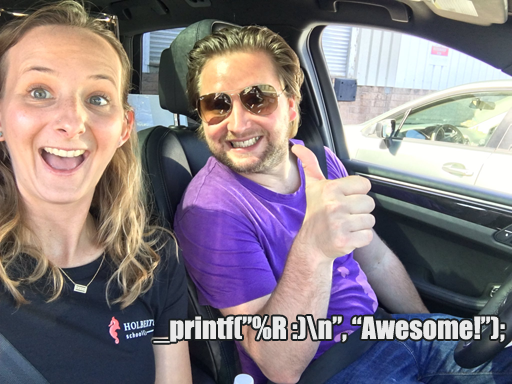C Group project
By: Julien Barbier, co-founder & CEO
For this project, we expect you to look at these concepts:
- Secrets of printf
- Group Projects concept page (Don’t forget to read this)
- Flowcharts concept page
There should be one project repository per group. The other members do not fork or clone the project to ensure only one of the team has the repository in their github account otherwise you risk scoring 0%
write (man 2 write)malloc (man 3 malloc)free (man 3 free)va_start (man 3 va_start)va_end (man 3 va_end)va_copy (man 3 va_copy)va_arg (man 3 va_arg)
$ gcc -Wall -Werror -Wextra -pedantic -std=gnu89 *.c
0. I'm not going anywhere. You can print that wherever you want to. I'm here and I'm a Spur for life
Write a function that produces output according to a format.
- Prototype: int _printf(const char *format, ...);
- Returns: the number of characters printed (excluding the null byte used to end output to strings)
- write output to stdout, the standard output stream
- format is a character string. The format string is composed of zero or more directives. See man 3 printf for more detail. You need to handle the following conversion specifiers:
- c
- s
- %
- You don’t have to reproduce the buffer handling of the C library printf function
- You don’t have to handle the flag characters
- You don’t have to handle field width
- You don’t have to handle precision
- You don’t have to handle the length modifiers
Handle the following conversion specifiers:
- d
- i
- You don’t have to handle the flag characters
- You don’t have to handle field width
- You don’t have to handle precision
- You don’t have to handle the length modifiers
Handle the following custom conversion specifiers:
- b: the unsigned int argument is converted to binary
Handle the following conversion specifiers:
- u
- o
- x
- X
- You don’t have to handle the flag characters
- You don’t have to handle field width
- You don’t have to handle precision
- You don’t have to handle the length modifiers
- Use a local buffer of 1024 chars in order to call write as little as possible
Handle the following custom conversion specifier:
- S : prints the string.
- Non printable characters (0 < ASCII value < 32 or >= 127) are printed this way: \x, followed by the ASCII code value in hexadecimal (upper case - always 2 characters)
6. How is the world ruled and led to war? Diplomats lie to journalists and believe these lies when they see them in print
Handle the following conversion specifier: p.
- You don’t have to handle the flag characters
- You don’t have to handle field width
- You don’t have to handle precision
- You don’t have to handle the length modifiers
Handle the following flag characters for non-custom conversion specifiers:
+space#
Handle the following length modifiers for non-custom conversion specifiers:
- l
- h
- Conversion specifiers to handle: d, i, u, o, x, X
Handle the field width for non-custom conversion specifiers.
Handle the precision for non-custom conversion specifiers.
Handle the 0 flag character for non-custom conversion specifiers.
12. Every time that I wanted to give up, if I saw an interesting textile, print what ever, suddenly I would see a collection
Handle the - flag character for non-custom conversion specifiers.
Handle the following custom conversion specifier:
- r : prints the reversed string
Handle the following custom conversion specifier:
- R: prints the rot13'ed string
All the above options work well together.
